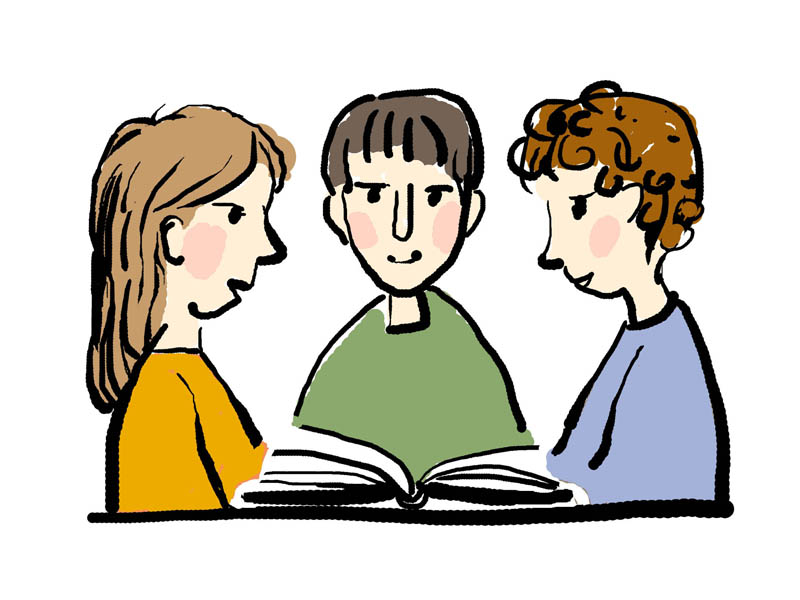
Papmambook asked experts, writers, and instructors of children’s writing workshops to share their thoughts on why they consider it important that children write. How does a child who writes differ from an adult writer? What do they expect from their students and what teaching approaches do they use? Finally, what are the psychological risks of creating literary work at a young age?
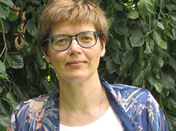
Maya Kucherksaya, writer, Professor at the Philology Department of the Higher School of Economics, Director of the Creative Writing School in Moscow
I want to put out a disclaimer—I don’t directly work with children who write, if we don’t count my seven-year-old daughter, who’s constantly coming up with something. I organize the children’s classes at our Creative Writing School. Naturally, I take the selection of instructors for children’s workshops very seriously. Everyone who has taught or currently teaches for us are professionals who are able to carefully, delicately lead a child through the free force of nature that is creative work. Freedom and tact: these are our two fundamental principles.
I’ll explain what I mean: a child’s fantasy is limitless, unusual, capable of things adults can’t even imagine. It should not be limited, it must live freely. But in order for it to take shape, a child needs tactful guidance that takes the existing languages of culture and literature into account.
A good upbringing aims, among other things, to enrich a child, to show her what she can do in this world—not just to get by, but for pure happiness, in order to grow. You can dance flamenco, play the flute or ping-pong, study French, and—look!—you can also come up with things, write stories about all of that—dance, music, France.
For younger grade-school-aged children, creative writing classes are an opportunity to feel words’ texture, taste, color. It teaches them that you can paint what surrounds you—lilac, cats, the sea—with words as well as paint. It will be just as colorful and moving. For children, our classes test the limits of words’ power. For teenagers, things are a bit different. To them, creative writing is just another instrument by which they come to know and make sense of themselves, the world, other people. Teenagers are also ready to learn the craft of writing—how to construct a narrative, build a hero, and give characters their own voice.
All too often, children’s creative pursuits turn into a vanity fair for their parents—fights break out behind the scenes over who will get the role of the silent page, because there are five boys auditioning for the role, and only four pages required on stage. Just recently I was witness to such scenes of maternal tragedy, which are so contagious for children as well. Listen, art is meant to bring happiness, not petty shoving backstage. We warn the parents that bring their children to our school that we simply teach them to approach text meaningfully, understand how to bewitch the reader (this fall, for example, we launch a fairytale workshop), how to work with words, but we don’t lead them to glory, success, applause. We’re not a modeling agency, no.
What’s the difference between a child writer and an adult writer? A child is not yet weighed down by what he’s read and by others’ wisdom. He writes as though he’s the first in the world to pick up a pen, which gives him the freedom that may lead to something no adult would ever come up with. That’s why many grown writers seek to return to that state, to retreat into childhood. Even Leo Tolstoy succumbed to this temptation, in choosing to write very simply, like a child. That’s not speak of absurdist writers like Daniil Kharms. This experience of the primeval is the advantage of a child’s awareness. Naturally, children are not as adept at analyzing or assigning meaning to events, particularly large scale phenomena, or history. Though for creative work, for a masterpiece, that is far from necessary.

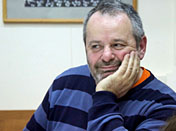
Lev Yakovlev, poet, playwright, Director of the Laboratory for Gifted Children at the Moscow's Gaidar Central Children's Library
The Laboratory at the Gaidar Library started five years ago and we currently have two groups—for older and younger children (7-12 years old). Many of the kids were participants in the Russian National Magic Word Literary Contest. I was on the jury and the kids’ manuscripts amazed me—I would be on the subway, reading, laughing out loud, crying. That hadn’t happened to me in ages. Of course, we can’t say for sure where they’ll end up, but one thing is clear: the kids are incredibly gifted. It’s wonderfully interesting to work with them, and the adults—parents, librarians, writers, and musicians—who come into the lab, enjoy the experience as much the kids do.
Many of the children don’t do well socially. Almost all, actually. It’s not easy for them at school. But here, they’re comfortable. You know, when strangeness encounters strangeness, there’s an understanding that being strange is normal. Our discussions are rather traditional: first the kids speak out, then the writer Vitaly Kaplan and I. The head librarian Tatyana Rudishina, too, of course, and visiting writers. What’s less traditional is the thorough work on style. Every child has a printed text in front of her, where she marks what she likes, and what she doesn’t. They discuss. These examples allow them to draw important conclusions. Sometimes, they engage in heated critiques of one another, but they still treat each other warmly. As for Vitaly and I, we speak with them as equals—we transmit our experience, and they transmit theirs. I’m not sure ours is always the more valuable.
You can’t force kids to write. That’s a conviction of mine. There was a case where parents made their daughter write all the time, every day. Basically literary assault. And she came out with endless boring texts (though she had started wonderfully). I tried to explain to them that it wasn’t necessary, that the quality of these texts was not improving—quite the contrary. They stopped coming. That story probably won’t end well. Coercion deadens the joy of creating.
Our boys often write absurd, incredibly amusing fairytales, while some are wonderful poets. The girls are good with realistic stories, where there are more details, struggles, musings. A few of them, too, are poets, incredibly musical. But I believe poets should learn to write prose, and vice versa. It develops talent, enriches it. Especially since you have to explain to prose writers that poetry is not simply a rhyming story. It’s best to use your own experience as an example. What else? On occasion, I call someone up a bit earlier to discuss their story one-on-one if it’s not too long, and they edit it on their computer on the spot, then read the new texts in the workshop. That’s good, because then they get praise, where they may have been criticized. Harsh criticism can kill off your desire to write.
Children need performances and publications—that supports their interest in writing. They get a response and understand that it’s not just they who need it—others do as well.
For now, not many see themselves continuing to engage with literature. They don’t see literature as a profession. Time will tell and we’ll see who catches that writing bug. At the moment, it’s important that they do what they find interesting and that they learn to express themselves in an interesting way. In school it’s different: a teacher asks a question, the student answers. What’s more—he knows how to answer to get an A. Here we don’t have teachers or students. At first, it’s new for them, but then they settle in. I prefer educational systems where children are free to speak out and their opinions—on all kinds of matters—are interesting to adults. Just like how we have it at the Laboratory.


Evgeniya Pasternak, writer
In 2013, along with the “Pink Giraffe” publishing house, Andrei Zhvalevsky and I ran a contest for 10- to 17-year-olds, of fanfiction based on works from the school curriculum. Fanfiction is writing based on an existing literary work.
The contest had two aims. The first was the proper pedagogical one. In order to write a fanfic, you have to read the text, not a summary. Since we asked them to write fanfics specifically based on works from the school program, we were hoping to motivate at least some kids to open the book. The second aim was the “bad” pedagogical one: we really wanted to take the pretension down a notch. We wanted to give kids the chance to mock the characters of classic works, to write not about “what the author wanted to say,” but what had they had bottled up inside and really wanted to say.
The results surprised us—in terms of both quantity and quality. There were more than a thousand submissions, while we had anticipated something closer to fifty. There was no mockery—to the contrary, the students smoothed out the endings of classic works. Turgenev’s Mumu didn’t drown. Anna Karenina chose to live. Pushkin’s Onegin married Larina, moved to America, and founded a martial arts school there. Dubrovsky and Masha were happy together. Gogol’s bad Government Inspector was punished by a new, good Inspector. To be honest, it was all very unexpected.
Submissions written under the wise supervision of a teacher were immediately apparent. The title page was properly formatted, the text perfectly edited. The writing was smooth and...unbelievably boring.
Real work by teenagers was disheveled but very much alive. My favorite was about a psychotherapist who treats literary figures. “Hello, I’m a student. I kill old ladies with an axe.” “Hello, I’m a prince. I have a problem: I talk to an oak tree.”
Andrew Zhvalevsky’s favorite is about Mumu: “Mumu was just about to drown, when the local beavers swam up to her…”
So why fanfiction? When you can’t swim too well, it’s easier to swim in a pool with a clearly marked lane than in the open sea. The literary work you use as the basis for your fanfiction can be just such a lane.
It’s very useful to be able to express your thoughts in writing. It’s a valuable advantage in any profession. The particular art you practice doesn’t matter, whether it’s drawing, sculpture, street art…. I think teenagers that have the chance to vent are more psychologically stable.
Particular psychological risks emerge when a child hears only praise. Once, we had a second-grader read her “creation“ aloud to us. It was complete nonsense: something about war, pretentious, patriotic, and full of factual errors. The adults listened to her, delighted, and said she was a future star and actually a genius. When the little girl realizes that she’s not a genius, she might have some issues.
The difference between a child writer and an adult writer is in life experience. A child can get away with writing: “And then Karenina changed her mind, went back to her husband, and they lived happily ever after.” He doesn’t see the problem. Or the main character of 50 Days Before My Suicide [by 16-year-old Anastasia Kholova, writing under the pen name Stace Kramer] goes to a party, gets drunk, almost gets raped, hits her assailant in the head with a vase, and, certain that she’s killed him, goes home. At home, she quickly falls asleep and calmly goes to school the next day as though nothing has happened. When the author is sixteen, there’s no problem here. But I would have a few questions for an adult writer.

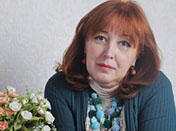
Aya Ehn, writer
2015 marks the completion of a novel I wrote with ninety-nine teenagers (we were just short of a hundred). The book is called Save Ivory, save Ivory Tyer. It’s a spinoff of my new fantasy series Mutangels.
My recipe for working with teenagers is as follows: find something to compliment them on, but don’t advise them to send their work to publishers and writing contests! Just quick and clear: “This worked well, and this, and that there. Yes, you can definitely be an awesome writer someday! Good job!” The key is to find what’s bad, but not just obviously bad—bad on the level that this particular teenager at this particular moment can understand and correct (after working on it on his own.) Point out the issue with no expectation that what we say will stick—it might come through a couple of years down the road. And—don’t point out weaknesses in front of others (including adults, especially parents, and particularly nervous parents) to those rare teenagers that are willing to work on their text at all. For the majority of children who write, it’s the plot that matters, not the execution. They want to get what they come up with out of their system. The words they choose for that—“Ah, what’s the difference?” We have to try to change this attitude toward the text, though it’s quite difficult and we don’t always manage.
I don’t think it’s important for children to practice creative writing. It’s much more important that they do math and physics, solve puzzles, learn technical drawing. It’s much more important to teach our children to think logically (not mythologically!), than to play with a mosaic of words, to spend time weaving lace from sentences. Creative writing is an important and necessary process, I won’t deny that! But it’s far from the most important.
Of course, there are psychological risks. The main risk is an inaccurate self-assessment, from “I’m a genius” to “I’m totally useless, my life is over.” A lot has been said on this matter, no need to repeat it here. But there’s another, less obvious, risk. These days, a teenager who writes can easily make a page on a site to self-publish literary works, create a social media page, even launch their own website—and post his or her novels and fanfiction on it. He immediately gains an audience of other teenagers, who read and “like” everything, and demand further installments. The page’s author develops a mistaken belief that he is already a writer. He starts to write excessively for the sake of writing, though he could well have... I personally know at least two talented teenagers who, sadly, went that way. And they had potential!

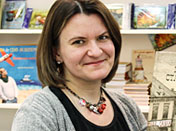
Natalia Volkova, philologist, writer, Director of the Children’s Literary Studio at the Pogodin Library in Moscow
I run a literary studio for children ages seven and up at the library for family reading. I wouldn’t venture to call our activity there serious creative writing. But I believe it’s important to interest children in creative work as a whole.
As a rule, my assignments and suggestions find fertile ground because children at this age are not yet afraid to use their imaginations and their thinking is unfettered. It’s only in childhood you see this sort of abandon, when there is no fear of making a mistake, when you don’t look back at your teachers or other writers, when your experience as a reader is not so rich so as to think: “That’s been done before...and this...and this….” In childhood everything is a first impression and what may seem like a banal idea to us adults can be a true discovery. That’s probably what differentiates a writing child from a writing adult—the lack of fear.
Even so, I try to tell them about the rules governing different genres and show them how these work in theory and practice. Assignments include writing a short study, a story, a sketch, or even a poem. Poetry is a whole different story. They all want to write poems and they all think their attempts aren’t bad. As a rule, however, what they consider poems are not quite that. So you have to balance on the edge, explaining the rules of poetry composition while trying not to hurt them or bury their creative spirit. I often simply say, “Thank you. I like that thought—it’s sincere, this part here worked well. Now let’s try to write a couplet according to all the rules. It’s not so easy to express a thought in two lines, all while maintaining the strict limits of rhyme and rhythm.”
It’s equally important to avoid excessive praise and not to scare children with critical comments. In both cases there are psychological risks: in the first, the child won’t develop further and will get used to undue praise, and in the second, he’ll lose his desire to create altogether, and he’ll decide that he’s incapable of this work.
Little by little they begin to sense what exactly is off with their own poems. It’s important that they feel this themselves, rather than hearing a verdict from me: “You can’t write like that. Those aren’t poems!” On the other hand, on occasion we do get real masterpieces.
A child needs creative work just like she needs to breathe. I’m convinced that there aren’t any children that are not inclined to such activity. Some adults are very good at killing the desire to think up things, fantasize, and create.
A thousand writing kids will give us, if we’re lucky, one writing adult. But that doesn’t matter. Creative writing can morph into something different with age and, most importantly, a person with creative experience as a child will unquestionably be more free. He will learn to express his thoughts, solve difficult logical problems (when constructing a plot, you have to take logic into account), and acquire his own writing style. In a practical sense, that will help in writing essays for school; in the future, it will be useful for business correspondence. But I still feel that, over and above the practical applications, what matters is that each of us is born as a creator and we have an innate need to tell stories. The opportunity to do so in a literary studio simply helps realize one of our purposes as humans.


Elena Lenkovskaya, art historian, writer, instructor at Litsovet literature school in Yekaterinburg
I wouldn’t say I have a particular approach to working with teenagers—aside from treating them as adults who have made their choice. Attending literature classes is a conscious adult act. At first we considered making two groups, one for teenagers and one for adults, but we soon understood that our students do great together and—just imagine—they work as equals. For children who sit alongside adults, it’s a major plus.
Apart from a sampling of good children’s literature, we actively quote and dissect the classics—from Gogol and Bulgakov to Flaubert and Akutagawa. We do have to take into account that some of our participants are under fifteen, so some of the adult literature is only recommended to those who are older.
We don’t just take apart excerpts and see how they’re built—we write! We do creative exercises right in the lesson and read the results out loud. Ten to fifteen minutes for individual writing right in the auditorium. Hard? Of course! But you came here because you want to write. After the classes, everyone unanimously agrees on the questionnaires that this was the hardest part. And the most interesting! In the end, the ability to mobilize yourself and focus can, and should, be trained. We get the most unexpected and colorful texts!
I don’t think it’s particularly important for children to do creative writing specifically. Let them follow their soul—do breakdancing, sing, practice carpentry, or swim. I do, however, think it’s important to support those who strive to write, who have found that need within themselves.
If you were to ask me how creative writing classes play a part in a person’s development I would probably answer with what you’d expect. They cultivate an intelligent, advanced reader (and a keeper of Russian literary language, which is not insignificant for our culture as a whole). As with any other art, these activities expand one’s horizons, nurture the soul, and develop the intellect. They provide the skills necessary to properly and persuasively express thoughts and intentions in writing—which can be quite useful in a range of life situations.
As for psychological risks, these are tied to adults’ response to a child’s efforts, rather than a particular creative activity. Excessive praise and labels like “talent, true talent” are quite likely more harmful than neglect.
On the other hand, a sincere interest, a sort of “come on, keep working, don’t stop” along with constructive criticism, is absolutely needed. We have to support the desire to grow, to develop, to show how wide the horizon is, to indicate that the greater your potential, the more demanding you should be to your work and the more ambitious the challenges you should undertake.
Do I expect that my students will grow into geniuses and write the classics of world literature? I don’t look that far into the future. But we have a very solid group. I believe in them and, most importantly, I find them interesting as individuals. We are seriously considering adding a second level for those who want to continue. We have many takers. And that is encouraging.

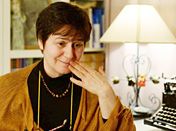
Marina Aromshtam, editor-in-chief at Papmambook, journalist, writer, teacher
Last May, we wrapped up the third season of our “Book Expert of the 21st Century” contest—a creative competition for teenage writers, who submitted essays about books they had read. Initially, our aim was to organize a platform for children who read and we saw the contest as a way to support children’s reading. Since the children wrote about books they chose themselves, the contest was supposed to be a sort of map to teenage reading, that both adults and teenagers could use to orient themselves.
But very quickly it turned out that among our contestants (and especially the winners), we have many children who write. For them, expressing their thoughts and experiences in words is an intrinsic need. Naturally, they need a space to showcase their abilities, a space where their obvious skill is in demand.
We decided to create a children’s editorial board within the Papmambook site and invited contest winners of various ages to write for us. Of course, writing about books and writing a story or novel are not one and the same. We offer children the opportunity to “work” in the sphere of book reviewing. This seemingly limits the field of their creative work and doesn’t bring them any closer to fulfilling what for some is a cherished dream—writing an awesome fantasy novel.
But I’m not convinced that exercises in writing novels can truly help one learn to write. It’s not likely that a novel will be “awesome,” if it’s written according to a recipe, even one put together by established writers.
For someone that writes (whether that’s a child or an adult)—the most important thing, I think, is to learn to speak with your own voice, to “mold” yourself in word. A book you’ve read is as good an occasion as any to share your thoughts. It’s always interesting to understand what happened between you and the book, you and the author. The author of the book affected you—how exactly did that happen and what’s the outcome?—you have to catch that, understand it, and manage to convey it. Or the author wanted affect you, but it didn’t work out—why? It turns out, teenagers rate most highly those essays where the author was able to connect what he read to himself, tie it to his own experiences and convey that process precisely. Besides, the teenage writer consciously or unconsciously measures himself against a new favorite book. He discovers for himself how it’s built and how he can do the same.
We publish children’s essays alongside those of adult authors. Adults are the primary readers, but they don’t read these essays because they find them cute. The testimony of what children have read is important to writers, librarians, and parents, not to speak of publishers. These essays have an undeniable social value.
So all this is absolutely serious. It’s not playing pretend, posing as writers and journalists. It’s real journalism. I would say that, among the main conditions for excellent journalism is the ability to think about your reader. You have to consider that your text will be read, and that reading it should not be a waste of time. So the author should learn to direct his aim and speak clearly about what matters most.
Translated from the Russian by Alisa Cherkasova
Follow us on Facebook.
